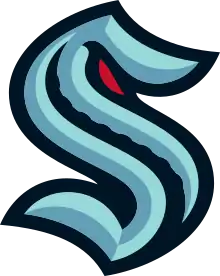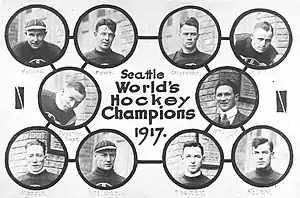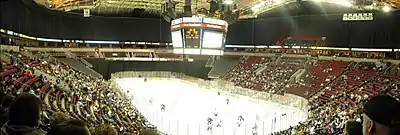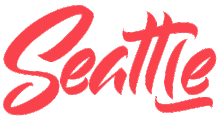Seattle Kraken
The Seattle Kraken are a professional ice hockey expansion team based in Seattle. The Kraken will compete in the National Hockey League (NHL) as a member of the Pacific Division in the Western Conference, beginning with the league's 2021–22 season. The team is owned by Seattle Hockey Partners, consisting of David Bonderman, Jerry Bruckheimer, and Tod Leiweke.
| Seattle Kraken | |
|---|---|
 | |
| Conference | Western |
| Division | Pacific |
| Founded | 2021 |
| History | Seattle Kraken 2021 |
| Home arena | Climate Pledge Arena |
| City | Seattle, Washington |
 | |
| Colors | Deep sea blue, ice blue, boundless blue, shadow blue, red alert[1][2][3] |
| Media | Root Sports Northwest |
| Owner(s) | David Bonderman, Jerry Bruckheimer, and Tod Leiweke |
| General manager | Ron Francis |
| Head coach | TBD |
| Captain | TBD |
| Minor league affiliates | Palm Springs (AHL) |
| Official website | nhl |
In December 2018, the NHL approved a proposal by Seattle Hockey Partners to grant an expansion franchise to the city of Seattle. In July 2020, the Kraken's name and branding were revealed.[4] It will be the first professional hockey team to play in Seattle since the Seattle Totems of the Western Hockey League played their last game in 1975, and the first Seattle hockey team to compete for the Stanley Cup since the Seattle Metropolitans, who folded in 1924. The team will play at Climate Pledge Arena.[5][6]
Background
History of hockey in Seattle

Professional ice hockey in Seattle dates back to the formation of the Pacific Coast Hockey Association (PCHA)'s Seattle Metropolitans in 1915. The 1917 Metropolitans were the first United States-based team to win the Stanley Cup, but folded in 1924, while the Seattle Totems played in the minor Western Hockey League (WHL) from 1944 until the WHL's dissolution in 1975. On June 12, 1974, the NHL announced that a Seattle group headed by Vince Abbey of the Totems had been awarded a tentative expansion team to begin play in the 1976–77 season along with a team in Denver.[7] The team, which according to season ticket promotions would have kept the WHL name of Totems, never came to fruition because of the original WHL's instability (the WHL was shut down the day the potential NHL team was announced), the inability of Abbey to gather the necessary funding and meet deadlines, and the poor performances on the ice and at the box office of 1974 expansion teams the Washington Capitals and the Kansas City Scouts. Abbey later came up short in bid to purchase the Pittsburgh Penguins and move the team to Seattle when they were sold in a bankruptcy auction for US$4.4 million in June 1975.[8] The NHL quickly rescinded the expansion offer and Abbey filed a lawsuit against the NHL, which he lost, and ended up paying the Vancouver Canucks over US$600,000 in damages.
A second attempt at an NHL expansion team in Seattle by a local group was made in 1990, but it failed again over the financial terms the NHL demanded. Then-Seattle SuperSonics owner Barry Ackerley committed to submitting an expansion application to the NHL by a September 15, 1990, deadline as part of a proposed new arena deal, provided that a group could be found willing to meet the NHL's asking price of $50 million. His son Bill, President of the Ackerley Group, worked with Bill Lear of the First National Bank of Chicago, in order to find an ownership group for the prospective franchise. The only group to step forward was led by Microsoft executive Chris Larson and former Seattle Totems player then coach Bill MacFarland. Ackerley and the Larson/MacFarland group met multiple times, but the Larson/MacFarland group determined that the expansion franchise was worth $15 million less than what the NHL was asking for. Ackerley advised that the only application they would be party to was one that met the NHL's $50 million threshold. As a result, when Bill Ackerley and Bill Lear met with the NHL's Board of Governors on December 5, 1990, they advised the group that they (Ackerley) were unsuccessful in finding an ownership group that was willing to meet the NHL's asking price, and so they were, out of respect to the Board of Governor's and their process, withdrawing their application. However, they also advised the Board that there was a Seattle Group, Larson/MacFarland, that wanted to present their offer to the Board, but the Ackerley group was not be party to that effort. As a result, the Seattle bid was denied as the NHL was able to find two markets (Ottawa and Tampa Bay) willing to meet their price. Larson and MacFarland represented to the Seattle media that it was the Ackerley Group that cost Seattle a chance at an NHL team, but in fact it was Larson and MacFarland's unwillingness to meet the NHL's expansion price.[9][10][11] A US$50 million expansion fee was more than any NHL club was valued at the time; a US$5 million down payment that would be forfeited if 10,000 season tickets weren't sold in the first year — the SuperSonics had never sold more than 9,000 season tickets; season tickets needed to produce at least US$9 million annually, which would've made the tickets the second most expensive for a team in the area at the time; a 20-year lease with a "substantial" share of arena revenues from concessions, parking, and ad signage; priority status for postseason arena dates; and a secured US$5 million line of credit in case the league had to take over ownership of the team at any point was also required.[12] As a result of these factors, Seattle was unable to secure an NHL franchise as part of its efforts to build a new arena.[13]

Later talks about a NHL team for Seattle were derailed by KeyArena. While originally built with an acceptable ice hockey configuration that was used by the WHL Totems, the largest arena in the Seattle area was considered problematic for NHL hockey from 1995 to 2018 due to renovations taking place in 1994 and 1995 that were tailored to the arena's major tenant at the time, the NBA's Seattle SuperSonics.[14] Notably, the sight lines for ice hockey left much to be desired. The scoreboard was significantly off-center in the arena's new ice hockey configuration, and so many lower-bowl seats were obstructed that half the lower bowl had to be curtained off for ice hockey. This was a major factor in the major junior Seattle Thunderbirds leaving for their own building in Kent in 2009. In 2012, League deputy commissioner Bill Daly stated that KeyArena would be "a difficult arena for hockey" due to the large number of obstructed-view seats.[15] All NHL exhibition games held in Seattle after the renovation were instead hosted at the Tacoma Dome 30 miles south of Seattle due to the issues KeyArena presented with its altered ice hockey configuration.[16]
Expansion and relocation proposals often came with a new arena proposal, especially after the SuperSonics relocated to Oklahoma City in 2008. From 2012 on as the NHL's interest in Seattle as a market rose, the city was positioned as a locale for expansion or a relocating team pending a viable arena. Multiple reports suggested Chicago Wolves owner and businessman Don Levin had expressed interest in building a new arena in nearby Bellevue that could host an NHL team.[17] On February 16, 2012, a plan was announced to build a new arena in Seattle's SoDo district, just south of Safeco Field. An investment group, headed by hedge-fund manager Chris Hansen, proposed the arena seeking a return of the SuperSonics and was interested in possibly having an NHL team as well. When Greg Jamison was unable to meet a deadline to purchase the Phoenix Coyotes on January 31, 2013, speculation began that the team would be relocated to Seattle.[18] On June 16, 2013, it was confirmed that the Phoenix Coyotes would be moving to Seattle if an arena deal between the team and the City of Glendale was not reached. Ray Bartozek and Anthony Lanza would purchase the franchise for US$220 million and immediately begin operations in Seattle for the following season.[19] However, on July 3, 2013, the Glendale City Council narrowly voted 4–3 to keep the Phoenix Coyotes in Glendale.[20] A 2013 study by Nate Silver concluded that Seattle had the largest number of avid ice hockey fans of any U.S. media market that did not have an NHL team.[21]
The Puget Sound region's highest level of ice hockey participate in the Canadian major junior leagues: the Seattle Thunderbirds, based 20 miles (32 km) south of Seattle in Kent, and Everett Silvertips, 25 miles (40 km) north of Seattle in Everett, both play in the current incarnation of the WHL.
Establishment of the team

.jpg.webp)
On December 4, 2017, the Seattle City Council voted 7–1 to approve a memorandum of understanding between the city of Seattle and the Los Angeles-based Oak View Group, co-founded by Tim Leiweke,[22] for renovations of KeyArena. Renovations for the arena were proposed to begin in 2018 and was fully completed in 2020.[23] The current KeyArena roof will remain in place as it is considered a landmark.[24] The rest of the building will see a complete renovation with land being dug down and out.[25] While the renovations are intended for acquiring an NHL franchise, acquiring a new SuperSonics basketball team was also within the design of the approval. On December 7, the NHL's board of governors agreed to consider an expansion application from Seattle, with an expansion fee set at US$650 million.[26] The Seattle ownership group was represented by David Bonderman and Jerry Bruckheimer, who conducted a preliminary season ticket drive to gauge interest in Seattle.[27]
On February 13, 2018, the Oak View Group officially filed an application with the NHL for an expansion team and paid a US$10 million application fee.[28][29] At the time, the earliest a Seattle NHL expansion team could have begun playing was the 2020–2021 season pending the completion of arena renovations.[28]
On March 1, 2018, a ticket drive began to gauge interests in season ticket deposits. Oak View reported that their initial goal of 10,000 deposits was surpassed in 12 minutes,[30] and that they received 25,000 deposits in 75 minutes.[31] On April 11, 2018, Tod Leiweke was named CEO of Seattle's NHL expansion team.[32] On June 18, 2018, Dave Tippett was named as a senior advisor.[33] Another step towards an expansion team was taken on October 2, 2018, when the NHL Executive Committee unanimously agreed to recommend the expansion bid to a vote of the Board of Governors in December.[34][35]
The NHL Board of Governors voted unanimously to approve Seattle's expansion team on December 4, 2018. Seattle will begin play in the 2021–2022 season as a member of the Pacific Division in the Western Conference; therefore the Arizona Coyotes will shift from the Pacific Division to the Central Division to balance out the four divisions at eight teams each. An expansion draft will be held on July 21, 2021, in a similar manner to a previous expansion draft held in 2017 for the Vegas Golden Knights, who will be exempt from it.[36][37][38] In May 2019, the team launched an interactive "fan portal" where fans can weigh in on the team name and uniform colors, answer poll questions, get information about ticket pricing and seating, and view a timeline of past and future key events involving the club and a section that spotlights some of the season-ticket depositors.[39]
On July 18, 2019, Seattle announced that it had hired former Carolina Hurricanes general manager Ron Francis as the team's first general manager.[40] On September 30, 2019, the team announced that its minor league affiliate in the American Hockey League (AHL) would be based in Palm Springs, California.[41] Due to the effects of the COVID-19 pandemic, the affiliate will not begin play until the 2022–23 season.[42]
On July 23, 2020, the franchise officially announced their team name, the Seattle Kraken, as well as their team colors, branding, and home jersey.[43] The event was held under the banner of "Release the Kraken", a phrase popularized by the 1981 film Clash of the Titans and the 2010 remake.[44] "Kraken" was a name that was already popular with fans prior to its official adoption. The franchise's promotional materials state that it was adopted to honor the maritime culture of Seattle, as well as in reference to the giant Pacific octopus, the largest species of octopus in the world, which can be found in the waters of the Pacific Northwest.[2]
Team information
Broadcasting
Everett Fitzhugh will serve as the team's radio play-by-play announcer. Fitzhugh had previously done play-by-play for the ECHL's Cincinnati Cyclones. He will be the first full-time play-by-play announcer of African-American heritage in NHL history.[45][46]
Kraken games will be broadcast regionally on Root Sports Northwest for the team's first five seasons. Former Hartford Whalers and Carolina Hurricanes broadcaster John Forslund will serve as the team's television play-by-play announcer.[46][47]
References
- Condor, Bob (July 25, 2020). "Color Guardians". NHLSeattle.com. Retrieved July 26, 2020.
- "Seattle Kraken". SeattleKrakenHockey.com. NHL Enterprises, L.P. July 23, 2020. Retrieved July 24, 2020.
- Cotsonika, Nicholas J. (July 23, 2020). "Seattle Kraken reveal nickname for NHL expansion team". NHL.com. Retrieved July 24, 2020.
- Condor, Bob (July 23, 2020). "Say It with Us: Release the Kraken!". NHL.com. Retrieved July 24, 2020.
- "NHL Seattle expansion team to play at Climate Pledge Arena". NHL.com. June 25, 2020. Retrieved August 5, 2020.
- Condor, Bob (June 24, 2020). "Making the 'Climate Pledge'". NHLSeattle.com. Retrieved August 5, 2020.
- Keese, Parton (June 13, 1974). "N.H.L. Gives Franchises To Denver, Seattle for '76". The New York Times. Retrieved August 5, 2020.
- "Seattle group bids today for Penguins". The Seattle Times. June 30, 1975. p. F1.
- Bill Ackerley
- Obermeyer, Jeff (March–April 2006). "Seattle and the NHL: So Close Yet So Far Away". SeattleHockey.net. Retrieved January 27, 2019.
- Eskenazi, David; Rudman, Steve (July 9, 2013). "Wayback Machine: Seattle's Long Wait For NHL". Sportspress NW. Retrieved January 27, 2019.
- Rudman, Steve (July 11, 2015). "Seattle and the NHL – Land Mines on Horizon". Sportspress NW. Retrieved January 27, 2019.
- Stein, Gil (1997). Power Plays: An Inside Look at the Big Business of the National Hockey League. Birch Lane Press. pp. 80–81. ISBN 1-55972-422-6.
- Andriesen, David (January 31, 2007). "Will the puck stop here?". Seattle Post-Intelligencer.
- Daniels, Chris (May 24, 2011). "Group interested in luring NHL to Seattle". KING-TV. Archived from the original on May 28, 2018. Retrieved February 14, 2018.
- "Canucks 4, Sharks 1". Associated Press. September 19, 1996. Retrieved September 25, 2016.
- Daniels, Chris (July 5, 2011). "Chicago businessman speaks on Bellevue and NHL". KING-TV. Archived from the original on April 2, 2012. Retrieved February 14, 2018.
- Eaton, Nick (January 31, 2013). "NHL's Phoenix Coyotes could be back on the table for Seattle". Seattle Post-Intelligencer. Retrieved February 14, 2018.
- Leahy, Sean (June 16, 2013). "Phoenix Coyotes moving to Seattle? Roenick reportedly part of Plan B for NHL". Yahoo Sports. Retrieved July 12, 2015.
- Wyshynski, Greg (July 3, 2013). "Phoenix Coyotes avoid relocation, stay in Glendale as city council passes arena lease". Yahoo Sports. Retrieved July 12, 2015.
- Silver, Nate (May 31, 2013). "Why Can't Canada Win The Stanley Cup?". FiveThirtyEight. Retrieved July 22, 2015.
- Baker, Geoff (December 4, 2017). "KeyArena MOU approved by Seattle City Council; will NHL announcement soon follow?". The Seattle Times. Retrieved February 14, 2018.
- Daniels, Chris (December 4, 2017). "KeyArena renovation wins approval from Seattle City Council". KING-TV. Retrieved February 14, 2018.
- Baker, Geoff (August 2, 2017). "KeyArena and iconic sloped roof get historical landmark status". The Seattle Times. Retrieved January 2, 2018.
- "Seattle hockey – Arena Renderings". Neutral Zone Seattle. December 11, 2017. Retrieved January 2, 2018.
- "Bettman says NHL will consider Seattle expansion bid". USA Today. Associated Press. December 7, 2017. Retrieved December 7, 2017.
- Rosen, Dan (December 7, 2017). "Seattle can begin NHL expansion process". NHL.com. Retrieved December 9, 2017.
- "Seattle applies for NHL expansion team". NHL.com. February 13, 2018. Retrieved February 14, 2018.
- Baker, Geoff (February 13, 2018). "Seattle group files application for NHL expansion team to play at KeyArena". The Seattle Times. Retrieved February 14, 2018.
- "Seattle 'shell-shocked' at ticket drive response". NHL.com. March 1, 2018. Retrieved March 2, 2018.
- Baker, Geoff (March 1, 2018). "Seattle surpasses 25,000 NHL season ticket commitments in just over an hour, OVG says". The Seattle Times. Retrieved March 2, 2018.
- Baker, Geoff (April 11, 2018). "Tod Leiweke named CEO of Seattle's expected NHL team". The Seattle Times. Retrieved April 11, 2018.
- "Group trying to bring NHL franchise to Seattle hires former Coyotes coach Dave Tippett". The Seattle Times. June 18, 2018. Retrieved June 18, 2018.
- Kimelman, Adam (October 2, 2018). "Seattle expansion bid recommended for NHL Board of Governors vote". NHL.com. Retrieved October 3, 2018.
- Baker, Geoff (October 2, 2018). "NHL executive committee unanimously recommends forwarding Seattle expansion bid to December vote". The Seattle Times. Retrieved October 3, 2018.
- Rosen, Dan (December 4, 2018). "Seattle NHL expansion approved by Board of Governors". NHL.com. Retrieved December 5, 2018.
- Cotsonika, Nicholas J. (December 4, 2018). "Seattle expansion frequently asked questions". NHL.com. Retrieved December 5, 2018.
- Stolzenberg, Holger (December 20, 2020). "Seattle Kraken expansion draft set for July 21". MSN. Retrieved January 10, 2021.
- Baker, Geoff (May 9, 2019). "Web portal launched by Seattle's NHL team lets fans weigh in on name, uniform colors and even their goal celebration sounds". The Seattle Times. Retrieved May 21, 2019.
- Quinn, Patrick (July 18, 2019). "NHL Seattle names Ron Francis as first general manager of hockey franchise". KOMO. Retrieved July 18, 2019.
- "AHL expanding to Palm Springs in 2021-22". theahl.com. September 30, 2019. Retrieved October 13, 2019.
- Powers, Shad. "'We were worried': Hockey to remain in the Coachella Valley despite arena move". The Desert Sun. Retrieved October 7, 2020.
- Booth, Tim (July 23, 2020). "Release the Kraken: Seattle unveils name for NHL franchise". The Washington Post. Associated Press. Retrieved July 24, 2020.
- Li, David K. (July 23, 2020). "Release the Kraken! Seattle's new hockey team will have a catchy, mythic name". NBC News. Retrieved July 24, 2020.
- Douglas, William (August 7, 2020). "Kraken set to have first Black full-time NHL team play-by-play announcer". NHL.com. Retrieved August 8, 2020.
- Clark, Ryan S. "Seattle Kraken hire John Forslund and announce TV broadcast deal". The Athletic. Retrieved January 26, 2021.
- McIntosh, Andrew (January 26, 2021). "NHL's Seattle Kraken signs multiyear TV broadcast rights deal". Puget Sound Business Journal. American City Business Journals. Retrieved January 30, 2021.